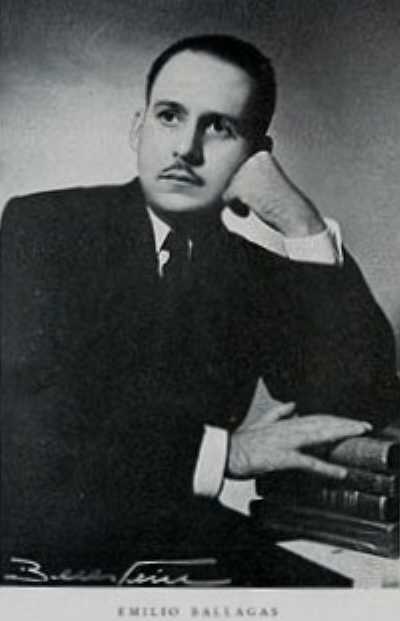4.1.1.17.4 The poetry collection “Cielo en Rehenes” (Sky in Hostages), by Emilio Ballagas (1908 – 1954)

“Cielo en rehenes” (Sky in Hostages), which earned Ballagas the 1951 National Literature Prize, consists of 29 sonnets of high poetic virtue, as the author creates a poetic cosmos ordered in its themes and rhythms, based on the chaos that is every human soul. Its three sections, “Cielo jozoso” (Joyful Sky), “Cielo sombrío” (Dark Sky), and “Cielo invocado” (Invoked Sky), exemplify the three emotional and poetic stages the author went through.
Throughout the collection of poems, the bard achieves a conceptual and emotional density, associated with a high-flying poetic expression, far from rhetoric and the delight of language only for itself, sometimes as a lyrical play without major consequences in its first stage.
The text is a clear sign of Emilio Ballagas’s maturity as a poet, which can be seen in the achievement of a contemplative and participatory serenity that is achieved in closed forms, relative to inner order, a spiritual haven after the failure of love and the vicissitudes of his encounter with a society that, although it admires him as a poet, is not at his level in terms of the perception of morality and what should constitute true values.
In the section corresponding to “Joyful Sky,” the poet returns to the genesis of his creation, to the enjoyment of someone who spreads out in the reality of nature and savors its essences, the paradise that he had lost and finds again in spirit, communicates in a lyric that also combines to a higher degree –just like and a little more than “Eternal Flavor,” but from serenity- the poetic emotion and the mastery of his lyrical instrument, with the highest notes.
For his part, “Dark Sky” repeats the anguish of the abyss from his previous collection of poems, gripped by a passion that reality prevented him from realizing, at the center of his ontological conflict; however, all of this appears mediated through a certain intellectual filter, the lucidity in the evocation of his storm, from the wasteland where melancholic halos still linger.
“Cielo invocado” constitutes the synthesis of his life. The poet has been in both heaven and hell and now emerges from the abyss with an expanded spirit, attuned to the perception of a sensorial yet transcendent beauty, whose ultimate face is ultimately that of the creator. The ultimate spirituality, in a ubiquitous sense, if you will, of being part of divinity, of divinity residing within him, has been based on the renunciation of his drives, part of the renunciation of himself.








